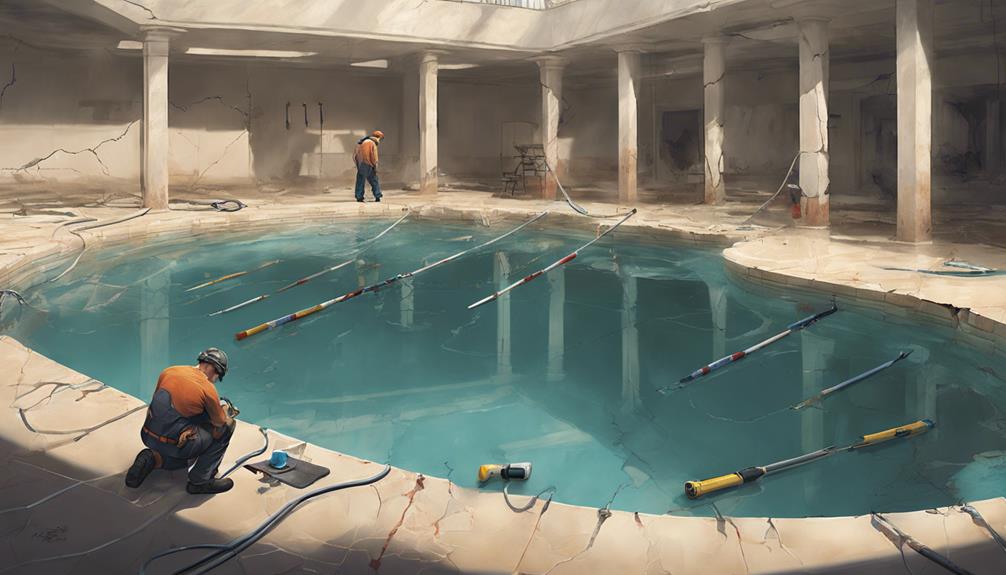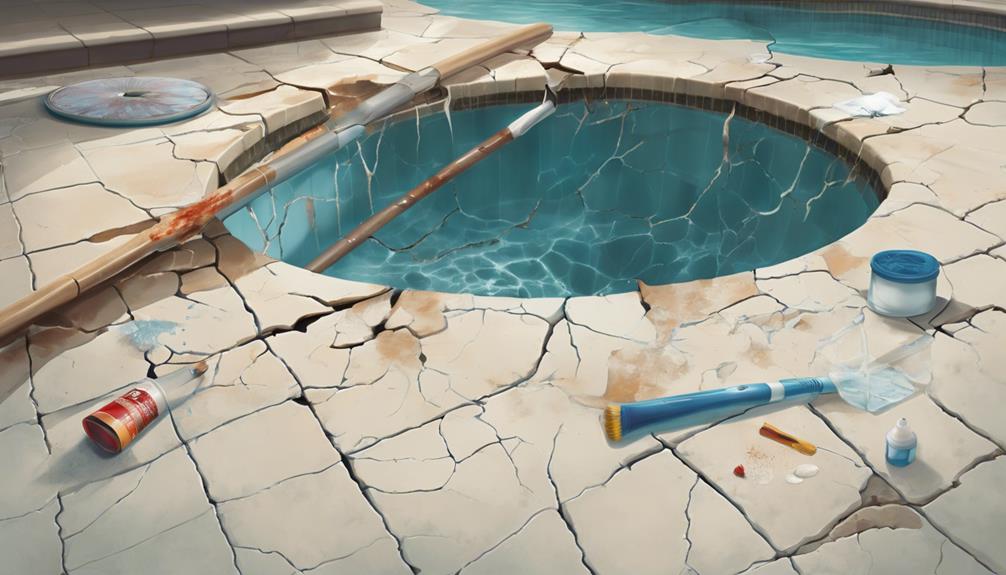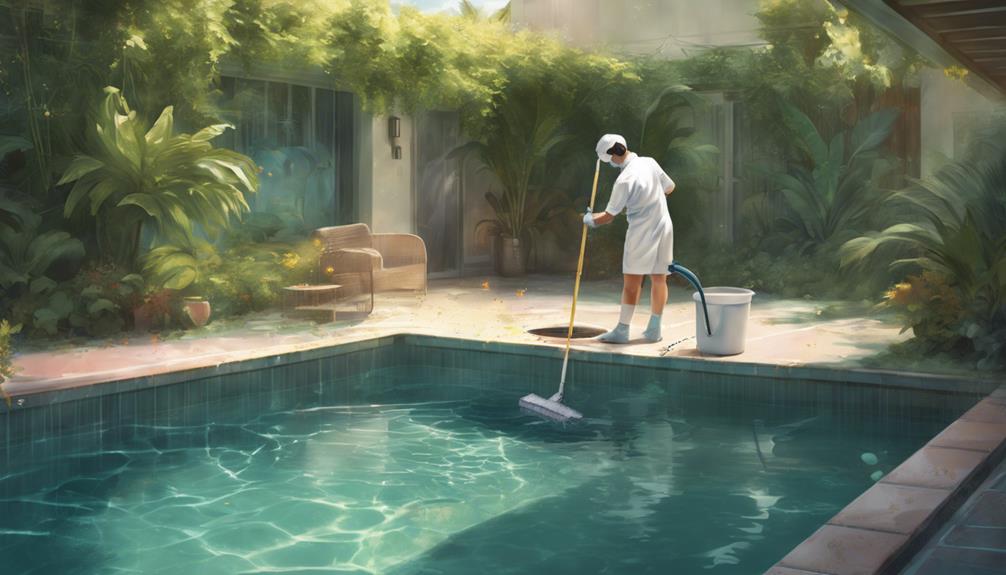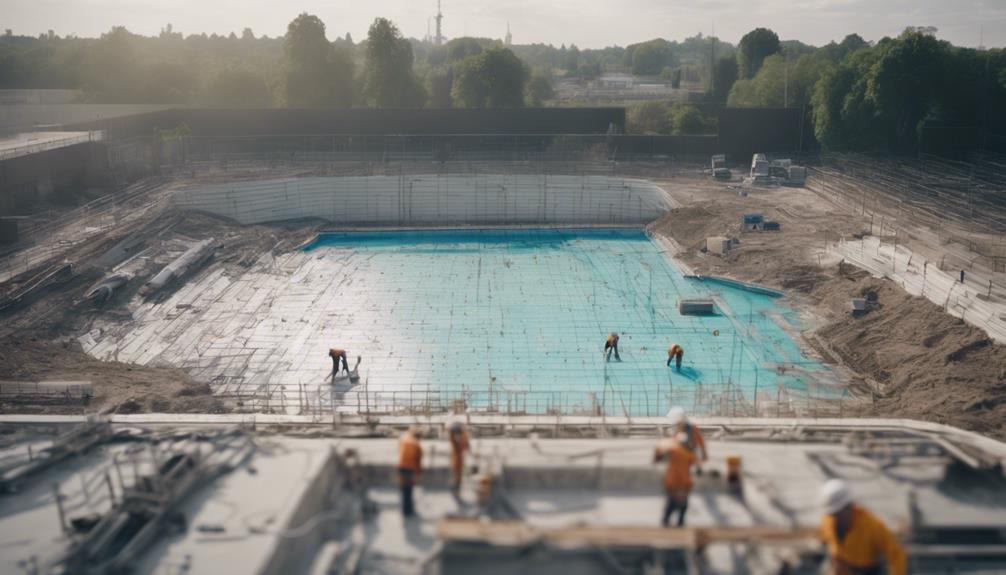When dealing with pool cracks, it is important to prioritize safety by assessing their severity and impact on the structure of the pool. Minor surface cracks can often be fixed with epoxy fillers to prevent further damage. However, deeper structural cracks may need immediate attention to maintain the integrity of the pool. Consulting with pool repair professionals can help in making informed choices on whether to repair or replace based on the extent of the damage. Regular maintenance and inspections are crucial in detecting problems early. Remember, addressing pool cracks promptly can avoid expensive repairs in the future.
Key Takeaways
- Address minor surface cracks promptly to prevent structural damage.
- Seek professional guidance for extensive structural cracks or major leaks.
- Consider pool replacement for age-related deterioration in pools over 20-30 years old.
- Evaluate cost-benefit analysis for repair versus replacement based on damage severity.
- Upgrade to energy-efficient systems through replacement for added value and functionality.
Understanding Pool Cracks and Damage
Understanding pool cracks and damage is essential for homeowners to effectively assess and address potential issues in their swimming pools.
Surface cracks, typically cosmetic, do not compromise the pool's structure, while deeper structural cracks can impact the pool's integrity and require immediate attention.
Factors such as ground movement, water pressure, age, and wear can all contribute to the development of cracks in a pool.
By recognizing the different types of cracks and understanding their causes, homeowners can better determine the severity of the damage and take appropriate action to prevent further deterioration.
Regular inspections and proactive maintenance can help identify issues early on, ensuring the longevity and safety of the pool for years to come.
When to Repair Your Pool
To determine the appropriate timing for pool repairs, homeowners should promptly address minor surface cracks with epoxy fillers and seal small leaks to prevent structural damage. Neglecting these minor issues could lead to more significant problems that may require costly repairs or even pool replacement.
Chipping, peeling, discoloration, and minor tile damage should also be addressed promptly to maintain the pool's integrity. Regular maintenance, including monitoring chemical balance and resurfacing affected areas, is essential for preserving the pool's surface.
Major Pool Damage? When to Replace

In cases of extensive structural cracks or major leaks, homeowners should seek professional guidance to determine whether pool repair or replacement is the best course of action. Structural cracks that compromise the integrity of the pool or major leaks that cannot be effectively sealed may indicate the need for a complete pool replacement.
Additionally, age-related deterioration, especially in pools over 20-30 years old, could warrant consideration for replacement rather than extensive repairs. By consulting with pool repair experts and conducting a thorough assessment of the damage, homeowners can make an informed decision on whether to invest in repairing the existing pool or opting for a replacement with modern, energy-efficient systems to enhance the value and functionality of their pool.
Making the Decision: Repair Vs. Replace
When faced with pool damage, homeowners must carefully evaluate the cost-benefit analysis of repairing versus replacing the pool structure. Repairing minor surface cracks, small leaks, and chipping promptly can prevent further structural damage.
However, extensive structural cracks, major leaks, and age-related deterioration may warrant considering pool replacement. Consulting with pool repair experts for a professional assessment is pivotal in making an informed decision.
Upgrading to modern, energy-efficient systems through replacement can add value to the property and enhance the pool's functionality. Regular maintenance and aesthetic upkeep are essential to preserve the pool's condition and appeal.
Ultimately, weighing long-term costs, potential upgrades, and property value addition are key factors in deciding whether to repair or replace the pool.
Prevention: The Best Strategy

When considering the long-term maintenance and preservation of your pool, prioritizing prevention emerges as the best approach to guarantee its safety and durability.
Regular maintenance plays a vital role in preventing small issues from escalating into major problems. Conducting annual professional inspections allows for the early detection of potential concerns, enabling prompt intervention.
Seeking expert pool care and maintenance services, such as those offered by Shoreline Pools, can provide invaluable guidance in maintaining the best condition of your pool.
By taking proactive measures to address any issues promptly and efficiently, you can ensure the safety and enjoyment of your pool for years to come.
Don't wait until problems arise; act now to safeguard your pool investment.
Frequently Asked Questions
Can DIY Methods Effectively Repair Structural Pool Cracks?
DIY methods may not effectively repair structural pool cracks. Structural damage requires professional assessment to determine proper repair or replacement. Consult experts like Shoreline Pools at (203) 357-1544 for guidance on ensuring pool safety and longevity.
How Do Weather Conditions Impact Pool Crack Repairs?
Weather conditions wield weight on pool crack repairs. Varying temperatures can worsen cracks, affecting repair efficacy. Heat may expand fissures, while cold can contract, exacerbating damage. Weather-wise assessments and timely repairs are essential for lasting pool integrity.
Are There Eco-Friendly Options for Pool Crack Repairs?
Eco-friendly options for pool crack repairs include using environmentally safe epoxy fillers and sealants. These products minimize chemical exposure and harm to aquatic ecosystems, ensuring a sustainable solution for maintaining your pool's integrity and longevity.
What Role Does Pool Usage Frequency Play in Repair Decisions?
Similar to a well-traveled road, pool usage frequency impacts repair decisions like traffic on pavement. High-frequency use accelerates wear, necessitating proactive maintenance and repair. Regular upkeep and timely interventions can extend the pool's longevity and performance.
Is There a Warranty on Pool Crack Repair Services?
Warranties on pool crack repair services vary by provider. Some companies offer limited warranties on their repair work, typically covering materials and workmanship for a specified period. It is advisable to inquire with the service provider for specific details.
Is a Pool Pump Replacement Necessary When Dealing with Pool Cracks?
When it comes to pool cracks, it’s important to assess the extent of the damage before determining if it’s time for replacement. In some cases, cracks can be repaired without the need for a full pump replacement. However, if the crack is severe and affecting the pump’s functionality, it may be time for replacement.
Is DIY Repairing of Pool Cracks a Better Option Than Replacing the Pool Entirely?
When it comes to repairing pool cracks, some homeowners may wonder if diy marbelite pool repair is a better option than replacing the pool entirely. While DIY repair can be a cost-effective solution, it’s important to consider the extent of the damage and whether professional expertise is needed for a long-lasting fix.
Conclusion
To sum up, pool cracks can vary from minor imperfections to serious structural risks, underscoring the significance of timely upkeep and restoration. According to a research conducted by the National Swimming Pool Foundation, 85% of pool cracks can be fixed if dealt with promptly, helping homeowners save substantial expenses in the future.
By grasping the intricacies of pool damage, making educated choices on restoration or substitution, and putting preventive measures in place, pool owners can safeguard their investment and prolong the lifespan of their pool.










